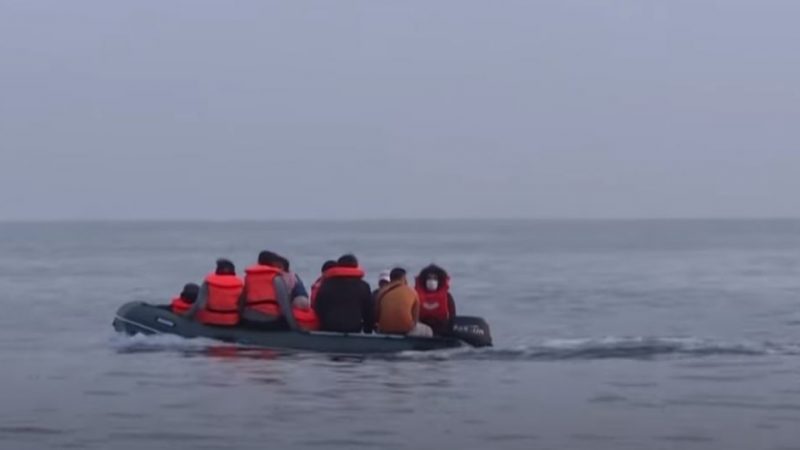One of the most harrowing images of 2021 has to be that of a damaged inflatable dinghy that had been carrying refugees, washed up on a beach near Wimereux, France. The incident sparked a wave of dissent about the government’s tough immigration policies.

The image is a poignant symbol of the 27 migrants who lost their lives when their dinghy deflated as they made a perilous crossing of the English Channel, and the plight of others making the journey on unseaworthy boats.
The incident, which took place on November 24, amounted to the largest single loss of life in the English Channel since the UN migration agency, IOM, began recording data in 2014. It is described as the worst disaster on record involving migrants crossing the English Channel.
Government’s harsh immigration policies under fire
As an ever-increasing number of people attempt to make the journey in vessels unfit for the sea, as they flee conflict, war, poverty or persecution from countries like Sudan, Afghanistan, Iraq and elsewhere, the government’s refugee policy has been heavily criticised.
Changes to the asylum and immigration system, which deter illegal entry and enable the government to remove people they say have no right to be in the UK with greater ease, has been condemned as “vague, unworkable, cruel and potentially unlawful.”
In the wake of the humanitarian disaster in November, calls are being ramped up to open a safe passage to Europe, as the best way to reduce the number of deaths as people fleeing persecution try to cross the Channel.
Experts believe that opening a safe route would reduce demand for the people smuggling operations of criminal gangs. It is said that by allowing a safe passage and a more generous system through which people can apply for resettlement, would help erode the business model of the people smugglers.
Kindertransport joins the calls
Thinking along these lines are several surviving members of Kindertransport – the organised effort to rescue almost 10,000 Jewish refugees before the Second World War. The members are urging the government to change direction on its approach to the refugee crisis. Including reopening safe route for refugees, especially children, attempting to reach the UK from Europe.
The November 24 tragedy sparked calls for a public inquiry into the deaths, as lawyers representing the bereaved family members said “serious failings” in a rescue operation may have contributed to the deaths.
Britain ‘losing its moral authority’
In reference to the crisis, Kindertransport members Stephanie Shirley, Alf Dubs and Erich Reich, said Britain is losing its moral authority in the world.
Alf Dubs, a tireless campaigner for refugee rights, who fled the Nazis before World War Two and went on to become a Labour MP, CEO of a charity, and member of the House of Lords, is urging the government to “do the right thing” and have safe and legal routes into the UK.
“We warned this would happen and that the policies the government has been following was going to lead to this happening,” said Lord Dubs.
“We shouldn’t allow this to happen. We should do the right thing. And the right thing is to have safe and legal routes for people to find safety. Not every refugee in the world, but certainly those that have some connection with Britain.
“That’s what was the position before we left the EU and it’s really a tragedy that we’ve gone backwards in this regard,” he added.
In 2016, the government accepted an amendment put forward by Dubs to resettle 3,000 refugees to the UK from Europe. When the scheme ended in 2020, only 480 unaccompanied children seeking asylum in Britain from Europe had been resettled.
In the wake of the UK’s departure from the EU, Dubs had proposed another amendment requiring the government to negotiate an agreement with the EU to ensure unaccompanied children in Europe could join family members in the UK after Brexit.
The amendment was however rejected.
“They’re closing down legal routes to safety, and I find that shocking. We’re pushing asylum seekers into the sea … We’re just doing the same as what is happening tragically in parts of the Mediterranean,” said Dubs.
Dame Stephanie Shirley, who escaped Nazi Europe in 1939 on a Kindertransport train, shares similar concern. Pointing to a recent survey by Safe Passage, an organisation aimed at helping refugees access safe routes to asylum, which showed that over half of the children the charity was supporting had lost faith in the UK’s legal asylum process, said: “I’m so proud of this country. I love it passionately, but we’ve lost our moral leadership in the world.
“We’ve got something like 11,000 children stuck somewhere on the streets of Calais, or in refugee camps [in Europe]. It’s not a safe place for children. Every day 17 go missing, and that means that they’ve been killed or exploited or have been trafficked.
“These are figures that are very difficult to accept in any civilised society,” she added.
Gabrielle Pickard-Whitehead is a contributing editor to Left Foot Forward.
Left Foot Forward doesn't have the backing of big business or billionaires. We rely on the kind and generous support of ordinary people like you.
You can support hard-hitting journalism that holds the right to account, provides a forum for debate among progressives, and covers the stories the rest of the media ignore. Donate today.



